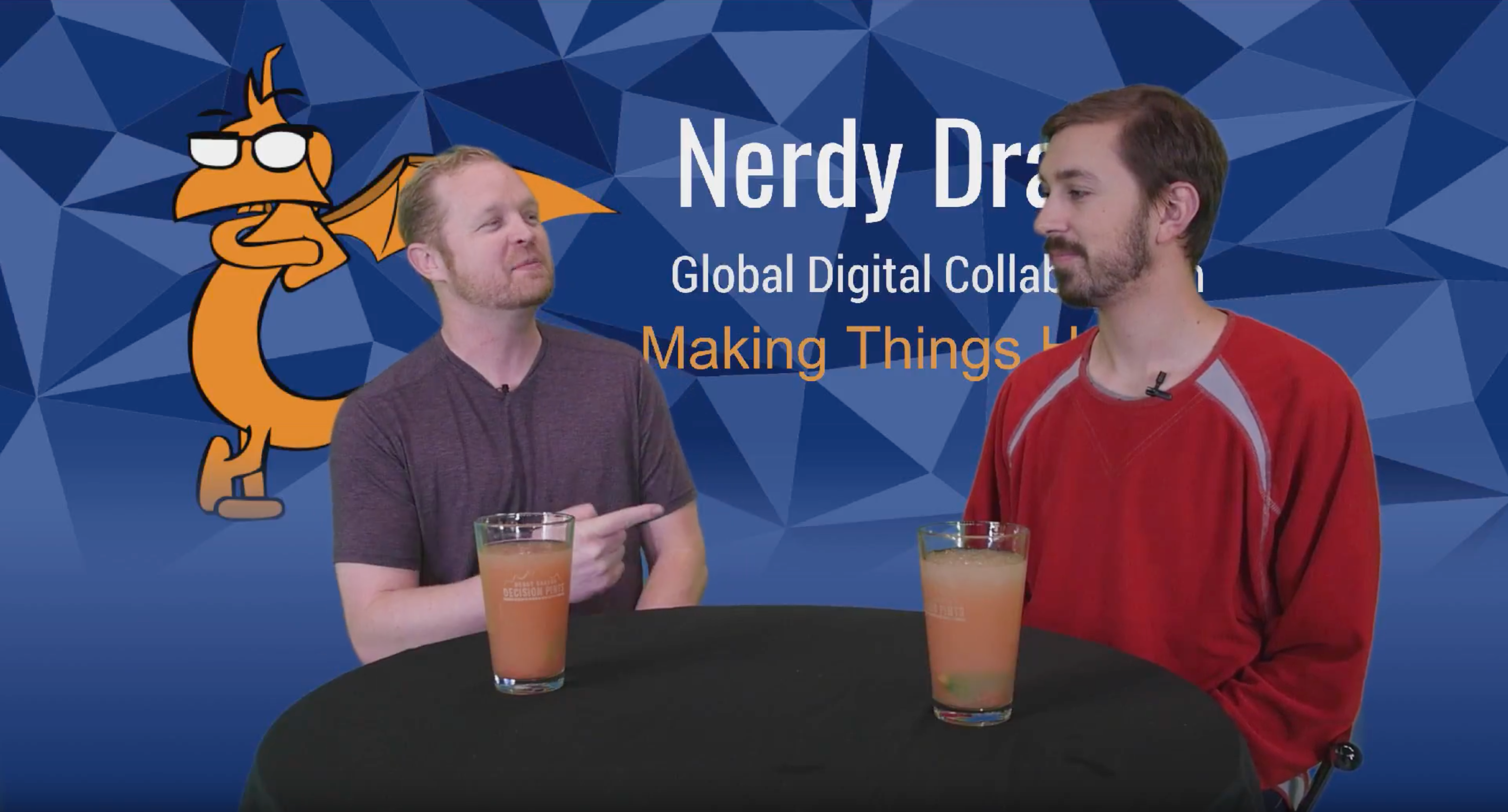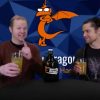By ndadmin on 02/06/2018
We sat down with James Shawver with SWYM - Share What You're Making. He likens it to "Pinterest for Engineers". The platform brings people, technology, and projects together to make things and connections.
James parlayed his passion for open source and making things happen into an exciting company. Learn about about him and SWYM.
Audio only:
Transcript below:
Jason: Hey , welcome everybody to another episode of decision pints . We're here with James [inaudible] was sharing what you're making and we are toasting to a grey hound , a cocktail which is a local [inaudible] distiller out of Caldwell , Idaho . Really the craftsman of Idaho's spirits and wine . Go . You're still Eugene's ? Yeah , that's good . You don't do a lot of cocktails . This was a nice change of pace . So Cheryl , you're making . Tell us a little bit , a little bit about that .
James: You kind of coined the phrase that it's similar to like a pinterest for engineers . Um , our main niche is kind of on the technology side of things . So a lot of people out there are probably familiar with like instructables , pinterest , etsy , stuff like that . And there's a couple other emerging markets like hacked her today . They're starting to get in the same space that we started out in , but truthfully they are marketing side of things is a little bit better , but were niched on the hardware side of things pretty hard .
Jason: Great . So , so when we go to your website , a swim home , s w y , m home [inaudible] , there's a number of kits on their broken down by type and my wife who's an artist was on there for years . She was looking at how do I trigger a motion sensor to activate some engaging artistic piece as she puts it installations together and Lo and behold , you had a kit on there already with the hardware to purchase and instructions for how to do it . So give us a little bit more detail around some of these other projects that are on there . And maybe pick your favorite
James: projects are community driven . The one that you actually mentioned was one with the neo pixels [inaudible] and one of our customers actually was the one that uploaded on there . It was a Arduino based one . Uhm , the guy was based out of I think Egypt for that project . Wow . So we bring in anybody from all over the world and that particular one enabled people to program specific lead sequences and stuff like that and to , in order to bring in lots of color into their projects and are awesome . So there's projects like that and then he mentioned that I should pick one of my favorites . Um , right now it's gotta be the fish feeder project where um , somebody came in and they had an Arduino device that they attached , like a real time clock in order to get ridiculously accurate timing of the day and then they knew that they needed to feed their fish twice a day and so they attached like a Servo and some other items and all that simply did was scoop up fish food and dump it into the tank twice a day . Specif specifically at like six in the morning and 6:00 PM or something like that . So that one was way too entertaining .
Jason: Yeah , that really is cool . A practical then and . Awesome . So on a scale of difficulty , how difficult is the fish feeding project ? It's not
James: bad at all . It's pretty streamlined where the programmer , um , put all of the code on there . So you just copy paste it if you know how to program the Arduino , it's legitimately just a click trail and then all you needed after that is how to wire things up . Um , if I remember right , the original uploader didn't do as good of a job showing how do I everything up so it's a little more difficult there , but our program or sas platform actually kinda rates all of those individual skills . So if you're really comfortable with programming , you can look for more complicated software gigs , but if you're not very comfortable with electrical wiring sided rates it on those as well .
Jason: Great . All right , well we'll , we'll check it out and let you know our feedback on your rating system . So this is a show about making things happen and the people who do it and obviously your platform and your company are enabling that . But let's step back and hear a little bit about you and how you got started doing this .
James: Yeah . Um , so truthfully I wanted to be an engineer probably since I was around five . So I've just known that my entire life . I started out wanting to go into aerospace and then developed into electrical engineering . Had the idea when I was in roughly eighth grade where a bunch of my friends at the time were also aspiring engineers and like , hey , it'd be really cool to create like an engineering firm and then have all of us work together . And then slowly as I got older I heard about this thing called open source . I was really into it because I'm like patents and whatnot . I'd heard a really bad rep against because like patent trolls and people going out and patenting things specifically so other people can't make it and stuff like that were sharing of ideas and concepts and just kind of everybody helping out as the intended community behind open source .
James: So I dove in and learn how to program at that point . And then once I hit high school , um , I joined the robotics team , was a person in charge of the electrical side of things and that's where it kind of found my niche and then was thinking about it . It's like , OK , well all of these programmers out there do a really good job with sharing things and whatnot . Why can't the hardware people seem to figure that out ? And so , um , I went on to that whole trend and it turned out the , another guy named Nathan said Dell had the same idea when I hit high school , but he drove off and created an entire company around it called spark fund electronics . And so I kind of piggybacked off of his whole philosophy , just learning was on university and then um , decided to try and help that community by creating this one home platform . Awesome . Well cheers to that . That
Jason: there's the open source open hardware open opportunities . So you've done a number of projects and we actually connected through the local , a startup hub trail head here , organization . We both co workout and small story here that uh , we actually were engaging on a project that had hardware component that we weren't involved in and a mobile APP component that they had actually invested years and a lot of effort and didn't get it quite right . And as they get low on budget , they call us always to vince and we'll do our best . Now we reached out to you and started working and surprise to me there are use cases that you think would be perfect for a mobile phone and yet that's actually gets in your way more so than just going with an Arduino Raspberry Pi . So talk a little bit about your position on using a phone for technology versus building some of these more lower level raw hardware components . The phone and the Arduino related stuff . Everything's embedded system and so it's of just choosing the correct tool for the job where in some aspects
James: application and that usually requires the simpler or I'm less processing power intensive micro controllers out there like the Arduino and stuff like that . And then there's a cell phone itself which is by definition an embedded system where it's got way more features , bells and whistles than you normally need because it's intended to call people . It's intended to download things . It's got this elaborate touchscreen , everything there . And it's also not normally to battery friendly because it has to support all those bells and whistles . And so when we originally heard about your guys project , we honestly were wondering why it wasn't just done with an Arduino , the first place because all we had to do was on a couple of GPO information . I'm kind of basic small level things . And from there , um , we ran into that hurdle of making the to embedded systems talk ,
Jason: right ? Because here you have in essence a voice recorder and the only difference was we needed to plug into an external system to be able to push a button to activate voice recording as opposed to pressing a tap on the screen . And it's still to this day surprises me a little bit that you have this fancy thousand dollar iphone that you can go in . And that simple function of creating a plug that you push a button and it records your voice is so slow that they talk about a little bit .
James: Yeah . So ended up happening there is the , the SPEC for the play pause event . And what we ended up using to be able to actually talk to the iphone before sending data across is defined to have a half-second delay for it to be able to detect various sequences . And so you've got a generic , just play a pause . It's like , oh , I pushed a button while that goes into an algorithm that's now listening for another press as well . And so it has to effectively time out before it's able to categorize that single press as a single press because if you do like a triple click , that's going to take more time and it doesn't know if there's repeated clicks
Jason: times out on the phone . A platform just needs that flexibility . So it opens that time gap as opposed to the embedded system that you can really customize to be , hey , we're never going to do a triple click , uh , just starting out . Very interesting . So as you look forward here , what are some things on your horizon that you're looking forward to accomplishing in the days ahead ? To have some good
James: projects ? We do have some good projects . Um , the majority of them are under NDA , so I'll have to think about what I can actually talk about . Um , OK . So one of the projects that we've got coming in house is a coffee grinder . I'm the Bluetooth and Wifi enabled , um , that one we're allowed to talk about . But the concept behind that is this person wanted to do a lot of statistical analysis on grinding individual grains of coffee and just took it to the nth degree on how complicated he could make this grinder . Um , there's a , another project , um , where the concept is for a , how do I phrase that ? It's a one of those fans that are actually spinning , um , they want to create something off of the persistence of vision based on that . And so we might get , be able to play around with that . Um , and then just various other Arduino and raspberry Pi related projects . Those ones that I'm not supposed to talk about the details ,
Jason: we'll will have to stay tuned for another update . And it's super exciting stuff as I went through my educational life and tinkered in hardware and , and kind of reoriented myself towards software because it's much more simplistic . There's fewer moving parts , I'm sure you can cause yourself a lot more grief and pain as a result of your every , uh , but it's , uh , it's really a remarkable accomplishment to have the level of , of depth and expertise that you have , plus the practical ability to apply it to real world business scenarios . And it's great to know that as somebody comes in and says , hey , I have this crazy idea that needs to all these different components can just say , ah , hang on just a second . A go talk to James and swim and a make it happen .
James: So with that , like that is kind of our passion is figuring out all of those pieces coming together . Because a lot of this stuff nowadays with embedded systems design and whatnot ,
Jason: lot of the components are plug and play on their specific niches . Like a cell phone you think can just be plugging into something and then it magically works . And then same thing with an Arduino . Everybody knows how that works and so really the design or niche there is coming up with the overall system architecture to figure out what makes the most sense and then putting in the extra effort to make it work together . People like you here , so that . Thank you for everybody that joined . If you have any questions on any projects or any recommendations , please fill it out in the comments below . Thanks again for visiting here , James . Thank you David . And three 60 immersive and a cone egg . Your Greyhound is delicious . Uh , everybody have a great weekend .










